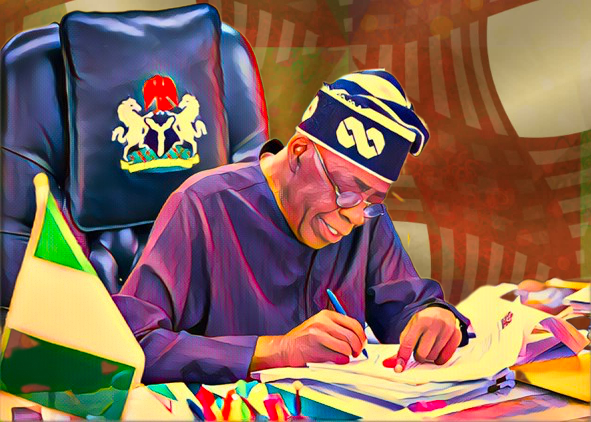President Bola Tinubu has signed a bill to extend the 2023 supplementary budget until March 2024, in a move to enhance the country’s security and infrastructure development. The bill, which was passed by the National Assembly on December 30, 2023, allows the government to continue spending from the N2.17 trillion supplementary budget that was approved in November 2023.
The supplementary budget, which was originally meant to last till December 31, 2023, covers urgent issues such as national defense and security, critical infrastructure, new wage awards for federal workers, cash transfers to vulnerable persons, and support to the Independent National Electoral Commission (INEC).
According to the Speaker of the House of Representatives, Tajudeen Abbas, who confirmed the president’s decision at the Abuja presidential villa, the extension of the supplementary budget will align with the 2024 capital component until March 31.
“The president signed two other bills. The first one is the supplementary appropriation bill of 2023, which he has agreed to extend by 90 days,” Abbas said. “So, it will continue to work concurrently with the 2024 budget up to March 31. He has also approved the 2023 main budget to concurrently operate with the capital component of the 2024 budget up to March 31, 2024.”
The extension of the supplementary budget comes amid rising security challenges and infrastructure gaps in Nigeria, Africa’s most populous nation and largest economy. The country has been grappling with insurgency, banditry, kidnapping, and communal clashes, which have claimed thousands of lives and displaced millions of people. The government has also been struggling to bridge the huge infrastructure deficit that hampers economic growth and development.
The president’s decision has been welcomed by some analysts and stakeholders, who see it as a positive step to address the pressing needs of the nation. They also commend the president for securitizing the N7.3 trillion Ways and Means debt balance, which represents the amount the government borrowed from the Central Bank of Nigeria (CBN) to finance its budget deficits.
“Securitizing the Ways and Means debt is a good move because it will reduce the pressure on the CBN and the money supply, and also improve the transparency and accountability of the government’s borrowing,” said Oluwaseun Oyebode, an economist and lecturer at the University of Lagos.
He added that the extension of the supplementary budget will help the government to complete some of the ongoing projects and programs that are critical for the welfare and security of the citizens.
However, some critics have expressed concern over the implications of the extension of the supplementary budget for the fiscal discipline and debt sustainability of the government. They argue that the government should have prioritized its spending and cut down on wasteful and recurrent expenditures, rather than extending the supplementary budget.
“The extension of the supplementary budget is a sign of fiscal indiscipline and lack of planning by the government. It will increase the fiscal deficit and the debt burden of the country, which are already high and unsustainable,” said Chinedu Okoro, a public policy analyst and civil society activist.
He also questioned the rationale behind some of the items in the supplementary budget, such as the N4 billion allocation for renovating the president’s Abuja residence and the N2.5 billion for the vice president’s quarters in Abuja.
“These are unnecessary and extravagant expenditures that do not add value to the lives of the people. The government should have focused on more productive and impactful sectors such as health, education, and agriculture,” he said.
Despite the divergent views on the extension of the supplementary budget, many Nigerians hope that the government will use the funds judiciously and effectively to improve the security and infrastructure situation in the country and to deliver on its promises of a better and prosperous future for all.
Source: BusinessDay


